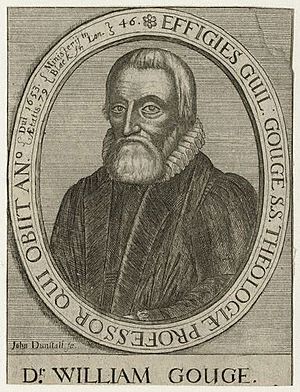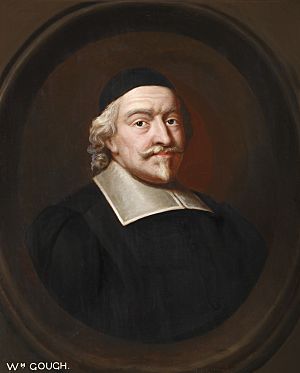William Gouge facts for kids
William Gouge (born 1575, died 1653) was an English Puritan church leader and writer. He worked as a minister and preacher at St Ann Blackfriars in London for 45 years, starting in 1608. He was also an important member of the Westminster Assembly from 1643.
Contents
Early Life and Education
William Gouge was born in Stratford-le-Bow, Middlesex, England. He was baptized on November 6, 1575. He went to several schools, including Felsted School, St. Paul's School, and Eton College. Later, he studied at King's College, Cambridge. He earned his first degree in 1598 and a master's degree in 1601.
Before moving to London, William Gouge taught at Cambridge University. He once caused a big stir by supporting a new way of thinking called Ramism. This was different from the older, traditional ideas of Aristotle.
Work as a Preacher and Author
At Blackfriars, William Gouge first worked as an assistant. He then took over as the main preacher.
He was very interested in a book called Calling of the Jews by Sir Henry Finch. Gouge published this book under his own name. This upset King James I of England, and Gouge was put in prison for a short time in 1621.
Even when he was almost 70 years old, Gouge regularly attended the Westminster Assembly. This was a group of important religious leaders who met to discuss church rules and beliefs. In 1644, he became the chairman of the committee that wrote the Westminster Confession. This was a very important document about Christian beliefs.
Of Domesticall Duties and Family Life
One of William Gouge's most famous books was Of Domesticall Duties (published in 1622). This book was very popular and gave detailed advice on family life during that time. It talked about the roles of different family members. The book was reprinted many times because it was so widely read.
William Gouge had a large family himself, with 13 children! His wife, Elizabeth Calton, sadly passed away shortly after their last child was born. They had married in the early 1600s.
Other Important Books
William Gouge wrote many other books. His book The Whole Armor of God (1616) talked about how religious faith changed over time.
In God's Three Arrows: Plague, Famine, Sword (1625 and 1631), he wrote about how diseases like the plague often affected poorer people more. He also believed that certain people, like leaders, should not leave areas affected by disease. Like other religious thinkers of his time, he supported the idea of holy war.
His huge book, Commentary on the Whole Epistle to the Hebrews, was published in 1655. It was a detailed study of a part of the Bible and included ideas for sermons. His oldest son, Thomas Gouge (1605-1681), helped get this book published after his father's death.
Works by William Gouge
- The Whole Armor of God (1616)
- Of Domestical Duties (1622)
- A Guide to Goe to God: or, an Explanation of the Perfect Patterne of Prayer, the Lords prayer. (1626)
- The dignitie of chiualrie (1626) – a sermon for a military group in London
- A Short Catechism (1635)
- A Recovery from Apostacy (1639)
- The Sabbath's Sanctification (1641)
- The Saint's Support (1642) – a sermon given in Parliament
- The Progress of Divine Providence (1645)
- Commentary on the Whole Epistle to the Hebrews (1655)
Family Connections
William Gouge had several famous relatives who were also Puritans. Five of his uncles were well-known Puritan leaders: Laurence Chaderton and William Whitaker married his mother's sisters. Also, Nathaniel, Samuel, and Ezekiel Culverwell were his mother's brothers. His cousin, Mary Culverwell, married Ezekiel Cheever.
 | William Lucy |
 | Charles Hayes |
 | Cleveland Robinson |



